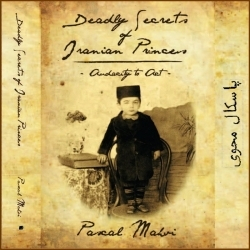Deadly Secrets of Iranian Princes
Audacity to Act
“He knows the oil is running out—and time with it,” runs the copy in the advertisement from the 1970s by American nuclear-power companies. “But he wouldn’t build the plants now if he doubted their safety. He’d wait. As many Americans want to do.” The man in the photograph is Mohammad Rezā Shāh Pahlavi, the Shah of Iran, from 1941 until his overthrow during the Iranian Revolution on February 11, 1979, being commercialized as a savior of nuclear energy at the time. The topic of nuclear power was, no doubt, highly controversial, but shows how even something as unassuming as an advertisement can come back to haunt a society in its mad quest for a perfect energy solution.
Deadly Secrets of Iranian Princes: Audacity to Act by Pascal Mahvi, written in the form of a memoir, provides an intimate account of Iranian high society during its last monarchy from the perspective of an American who is also an Iranian descendent of royalty—a distant cousin to the Shah. The book is split between two separate stories that pivot around the author’s father, Abolfath Mahvi: one is Mahvi’s role in the early stages of Iran’s nuclear program and the other focuses on the son’s conflicts with identity and livelihood as the heir apparent of his father’s fortune in an increasingly dangerous and dishonest world.
The first—and culturally more significant—narrative begins with the start of the country’s nuclear project itself, a foundation laid when in 1952 the British government invited agent Kermit Roosevelt, Jr., director of the CIA in London, to overthrow democratically elected Iranian Prime Minister Dr. Mohammad Mosaddegh in order to keep him from nationalizing the oil industry and shutting out the Anglo-Iranian Oil Company. After two military coups and a Communist uprising, Mosaddegh was successfully deposed and the Shah of Iran, Crown Prince Mohammad Reza, was restored to power through endorsement by the CIA. The Shah was a figurehead of the Islamic religious right, whose primary initiative was that the Shah should produce weapons of mass destruction for the defense of Iran. This pivotal story revolves around the relationship between best friends Abolfath Mahvi, a man known as the “Iranian Howard Hughes,” and Crown Prince Mohammad Reza, the Shah of Iran, who are brought together by fate to form an empire; Mahvi provides the modernized renovation and advanced infrastructure for the Shah’s military-industrial complex, replete with the omega of all things, the uranium enrichment and nuclear energy project.
The second narrative focuses more on the personal life of the son and the fractured business legacy of the father as a result of the revolution in the wake of Khomeini’s ascension to power in 1979. Although interesting, the memoir detracts from the bigger story, even shifting awkwardly into the present tense during the span of the remaining three decades. Despite these shortcomings, the invaluable, at times shocking, and very rare insight provided by Mahvi should not be ignored.
Anyone interested in Iran’s nuclear program would find this book of interest, as would the history buff and the politically curious.
Reviewed by
Derek Cram
Disclosure: This article is not an endorsement, but a review. The publisher of this book provided free copies of the book and paid a small fee to have their book reviewed by a professional reviewer. Foreword Reviews and Clarion Reviews make no guarantee that the publisher will receive a positive review. Foreword Magazine, Inc. is disclosing this in accordance with the Federal Trade Commission’s 16 CFR, Part 255.

